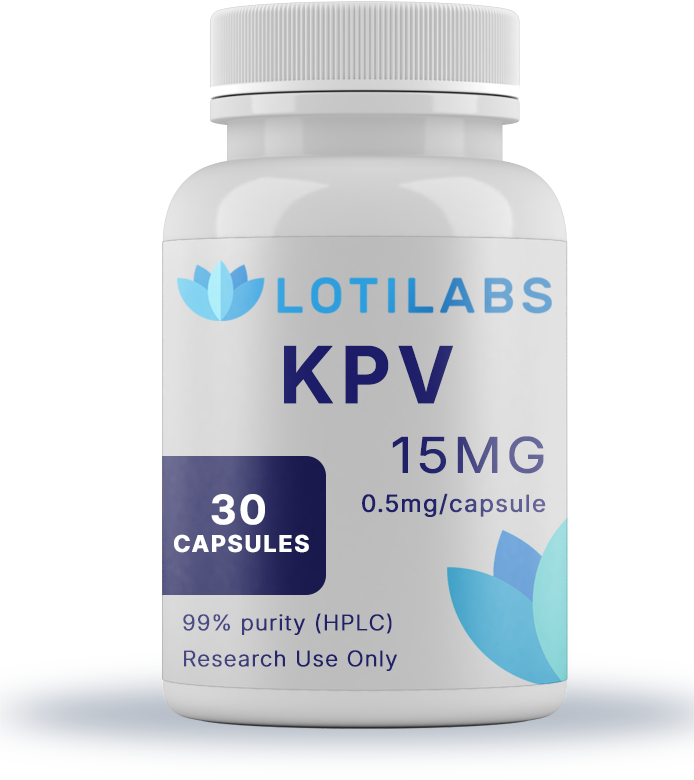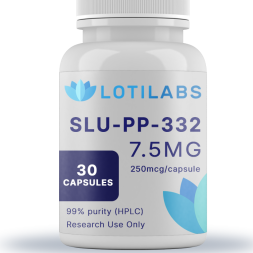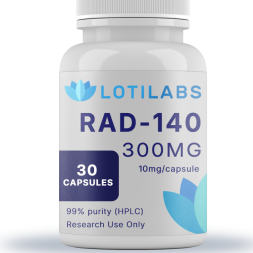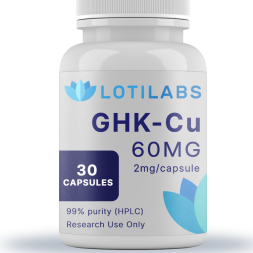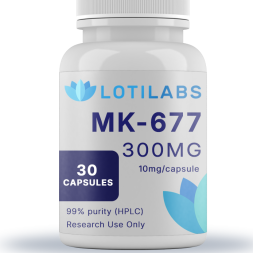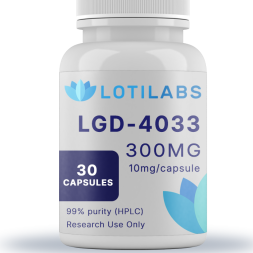-
×
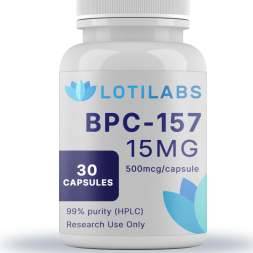 BPC-157 Capsules (500mcg/capsule, 30 capsules)
1 × $64.99
BPC-157 Capsules (500mcg/capsule, 30 capsules)
1 × $64.99
KPV Capsules (500mcg/capsule, 30 capsules)
You save
Capsules are for laboratory, research, analytical, and measurement purposes only. Capsules offer a protective barrier between sensitive chemical compounds and environmental elements, such as moisture. Not for human consumption or veterinary use.
Description


Buy KPV Capsules: Complete Research Guide to Lysine-Proline-Valine Procurement
Research into peptide compounds has expanded significantly in recent years, with KPV capsules emerging as a subject of considerable scientific interest. The tripeptide Lysine-Proline-Valine represents a synthetic derivative of alpha melanocyte stimulating hormone, designed specifically for laboratory applications and experimental research. Understanding how to properly purchase and handle these research compounds requires careful consideration of quality standards, regulatory compliance, and supplier credentials.
Scientists and researchers seeking to buy KPV capsules must navigate a complex landscape of peptide suppliers while ensuring adherence to research use only guidelines established by regulatory bodies including the Food and Drug Administration. This comprehensive guide examines the critical factors involved in procuring high-quality KPV peptide formulations for legitimate research applications. Some KPV capsules are formulated to contain 500 mcg of the acetylated and amidated isomer of KPV per capsule, emphasizing the importance of precise dosage in research settings.
Understanding KPV Research Compounds
KPV capsules contain the synthetic tripeptide sequence with a molecular weight of 342.43 g/mol, representing an active bioregulator fragment derived from the C-terminal end of alpha melanocyte stimulating hormone. Research suggests this peptide may demonstrate unique properties in laboratory settings, distinct from its parent hormone due to the absence of pigmentation effects while retaining significant bioactivity.
The synthetic nature of this compound allows researchers to study specific amino acids sequences without the complexity of full-length hormonal structures. Studies indicate that KPV may exhibit anti inflammatory characteristics and antimicrobial effects in controlled research environments, making it valuable for investigating cellular mechanisms and inflammatory responses.
Laboratory investigations have examined how this peptide interacts with various cellular pathways. Research suggests that KPV may influence nuclear factor kappa B signaling, though these findings remain within the scope of experimental research rather than clinical applications. The compound’s ability to enter cells and interact with inflammation-related molecules has made it a subject of ongoing scientific investigation.
Research Applications and Laboratory Findings of KPV
KPV peptide, composed of the amino acids lysine, proline, and valine, represents an intriguing subject for laboratory investigation due to its diverse research applications and potential for scientific study. As an active bioregulator fragment derived from alpha melanocyte stimulating hormone, research suggests that KPV demonstrates notable anti-inflammatory and immunomodulatory properties in controlled laboratory environments. These characteristics indicate that KPV may influence inflammatory responses in research models, making it a compelling compound for investigating symptoms associated with various conditions in laboratory settings.
One of the most fascinating aspects of KPV for researchers is its ability to modulate inflammation in laboratory studies, which is central to understanding conditions such as inflammatory bowel disease and other disorders marked by chronic inflammation in research contexts. By targeting key pathways involved in immune response mechanisms, research suggests that KPV peptide may influence symptom management and support healing processes in experimental models. Additionally, laboratory investigations indicate that KPV may possess antimicrobial properties in research settings, further expanding its potential utility for studying infection response and overall physiological function in controlled environments.
For researchers interested in incorporating KPV into their laboratory protocols or scientific investigations, KPV capsules by Integrative Peptides offer a convenient and reliable research compound, typically available in bottles containing 60 capsules for laboratory use. However, it is essential for researchers to consult with qualified scientific personnel before beginning laboratory protocols to discuss the suggested research applications, potential experimental outcomes, and any possible variables that may affect results. This is particularly important for research facilities with specific protocol requirements or those conducting studies alongside other compounds.
As scientific investigation into KPV continues to evolve, its role in laboratory studies of healing processes, inflammation reduction, and gut health research positions it as an exciting area of study with the potential to inform new approaches to disease research and wellness investigation. When considering acquisition for research purposes, always prioritize quality and transparency from reputable scientific suppliers to ensure the best outcomes for your laboratory investigations or research objectives.
Research Applications and KPV Compound Procurement
Research suggests that maintaining optimal digestive tract function represents a fundamental area of scientific investigation, and KPV compound has emerged as a promising subject for laboratory studies in this domain. Research findings indicate potential for reducing inflammatory markers and supporting tissue repair mechanisms in controlled study environments. Laboratory investigations suggest this compound may offer valuable insights for researchers focused on digestive system studies and immune response research applications.
When looking to procure KPV research compounds, it is crucial to select a reputable laboratory supplier such as Integrative Peptides, known for offering high-quality research formulations. Product specifications, including the standard 60-unit research container, should be carefully reviewed to ensure you are receiving a compound that meets your laboratory research requirements. Additionally, some research suppliers may provide complimentary shipping or other research incentives, so it is worthwhile to compare options and examine feedback on the supplier’s website to make an informed procurement decision for your research facility.
Before incorporating KPV compound into your research protocol, it is recommended to consult with qualified research professionals, especially if working within specific laboratory parameters or utilizing other research substances. This ensures that the use of KPV compound aligns with your individual research objectives and minimizes the risk of experimental complications. By prioritizing quality, transparency, and professional research guidance, investigators can confidently explore the research potential of KPV in laboratory studies examining digestive function and inflammatory response mechanisms.
Quality Standards for Research Procurement
When researchers seek to purchase kpv capsules, establishing quality standards becomes paramount for ensuring experimental validity. Reputable suppliers typically provide certificates of analysis demonstrating peptide purity levels exceeding 98%, along with comprehensive third-party testing data. These quality measures help ensure that research outcomes reflect the intended compound rather than contamination or degradation products.
Manufacturing standards should align with Good Manufacturing Practices, particularly for suppliers serving the research community. Documentation should include detailed specifications covering molecular weight confirmation, amino acids sequence verification, and stability testing under various storage conditions. Proper quality control extends to packaging, with many suppliers utilizing specialized containers that protect against light exposure and moisture infiltration.
Analytical testing methods such as high-performance liquid chromatography and mass spectrometry provide researchers with confidence in compound identity and purity. Suppliers offering comprehensive analytical data demonstrate commitment to research integrity and regulatory compliance, essential factors when selecting a procurement source.
Purchasing Considerations and Supplier Selection
The landscape for researchers looking to buy KPV capsules includes specialized peptide suppliers, research chemical companies, and online retailers focused on laboratory applications. Stock availability varies among suppliers, with many offering standard formulations containing 250mcg per capsule in bottles of 60 capsules, providing researchers with consistent dosing options for experimental protocols.
Integrative peptides kpv capsules represent one formulation approach, though researchers should evaluate multiple suppliers to identify optimal quality and service combinations. Capsules by integrative peptides and similar formulations may include additional components designed to enhance research utility, such as absorption enhancers or stabilizing compounds.
When evaluating suppliers, researchers should prioritize those offering detailed product information, including storage recommendations, expiration dating, and batch-specific documentation. Free shipping policies and responsive customer service can facilitate research workflows, particularly for institutions conducting ongoing peptide research programs. Reviews from other researchers and institutional buyers provide valuable insights into supplier reliability and product consistency.
Advanced Formulations and Research Applications
Modern kpv peptide formulations may incorporate sophisticated delivery technologies designed to enhance research applications. Some suppliers offer capsules containing SNAC (sodium N-[8-(2-hydroxybenzoyl)amino]caprylate), which research suggests may increase intestinal absorption significantly compared to standard formulations. These enhanced versions allow researchers to investigate bioavailability questions and optimize experimental protocols.
Combination products featuring KPV alongside compounds like Palmitoylethanolamide (PEA) enable researchers to explore potential synergistic effects in laboratory settings. Such formulations support investigations into multiple pathways simultaneously, potentially providing insights into complex biological interactions involving inflammation and immune system responses.
Research applications span multiple disciplines, from investigating gut health mechanisms to examining antimicrobial effects against various pathogens. Studies have explored how KPV may interact with Staphylococcus aureus and Candida species in controlled laboratory environments, contributing to understanding of peptide-based antimicrobial action. These investigations remain strictly within research contexts, contributing to scientific knowledge rather than therapeutic applications.
Regulatory Compliance and Safety Protocols
Researchers must understand that kpv capsules fall under research use only classification in most jurisdictions, requiring strict adherence to laboratory protocols and regulatory guidelines. Products sold by reputable suppliers, including those offered by Loti Labs, are specifically designated as not for human use, reflecting regulatory requirements and safety considerations.
Proper handling protocols include storage at recommended temperatures, typically 2-8°C, and protection from light and moisture to maintain compound stability. Researchers should implement appropriate safety measures in their laboratories, including proper waste disposal procedures and personnel training on peptide handling protocols. Understanding local regulations regarding research chemical procurement and use remains the responsibility of individual researchers and institutions.
The regulatory landscape continues evolving, with oversight bodies monitoring peptide research applications and ensuring compliance with established guidelines. Healthcare provider consultation may be advisable for researchers working in clinical research environments, though such interactions should focus on research methodology rather than therapeutic applications.
Storage and Handling Best Practices
Maintaining peptide integrity requires attention to environmental factors that may affect compound stability. Research suggests that KPV capsules maintain optimal activity when stored under controlled conditions, away from temperature fluctuations and humidity exposure. Many suppliers recommend refrigerated storage and protection from direct light to preserve peptide structure and function.
Laboratory protocols should include regular monitoring of storage conditions and documentation of handling procedures. Researchers should establish clear procedures for compound access, ensuring that only trained personnel handle peptide formulations. Proper labeling and inventory management help prevent confusion and ensure experimental reproducibility.
Expiration dating provides guidance for compound use timelines, though researchers should monitor for any signs of degradation or contamination regardless of stated shelf life. Quality peptide suppliers typically provide detailed storage recommendations specific to their formulations, and following these guidelines helps ensure research validity.
Cost Considerations and Value Assessment
Pricing for research-grade KPV varies among suppliers, with factors including purity levels, testing documentation, and packaging affecting overall costs. Researchers should evaluate total value rather than unit price alone, considering factors such as shipping policies, customer support, and analytical documentation when making procurement decisions.
Bulk purchasing options may provide cost advantages for research programs with ongoing peptide requirements, though researchers should balance potential savings against storage limitations and expiration concerns. Some suppliers offer institutional pricing or research discounts, making high-quality compounds more accessible to academic and research institutions.
The investment in quality peptide formulations typically justifies higher costs through improved research outcomes and reduced experimental variability. Researchers should view peptide procurement as a critical component of research infrastructure, warranting careful supplier selection and quality prioritization over cost minimization alone.
Research Applications and Laboratory Findings
The research applications and laboratory findings surrounding KPV peptide compound are increasingly documented within scientific literature, with studies highlighting its anti-inflammatory and immunomodulatory properties in controlled research environments. As an active bioregulator fragment, research suggests KPV may demonstrate utility in laboratory models examining various pathological processes through gut health modulation, inflammation reduction, and potential antimicrobial activity in research settings. These observed properties in laboratory studies suggest that KPV compound may help researchers better understand the progression of chronic inflammatory conditions such as inflammatory bowel disease models and colitis-associated pathways in research applications.
While the current body of research findings shows promise in laboratory settings, it is important to acknowledge that further studies are needed to fully understand the research potential and limitations of KPV compound in controlled environments. Researchers interested in exploring KPV as part of their laboratory investigations should consult with qualified research professionals to discuss the potential research applications, suggested research protocols, and any considerations regarding interactions with other research compounds or experimental conditions. Research suggests KPV may be a valuable addition to comprehensive laboratory research strategies, but its application should always be guided by professional research oversight and thorough review of available peer-reviewed literature and compound specifications.
By staying informed about current research developments and working closely with qualified research professionals, investigators can make educated decisions about the utilization of KPV peptide compound in research settings, leveraging its documented potential to promote healing responses in laboratory models, reduce inflammatory markers in controlled studies, and support overall research objectives in experimental frameworks. As research continues to advance in this field, KPV stands out as an exciting area of investigation with the potential to shape future approaches to understanding disease mechanisms and therapeutic pathways in laboratory environments.
Future Directions in KPV Research
The expanding interest in peptide-based research continues driving innovation in compound formulation and delivery technologies. Suppliers are developing increasingly sophisticated formulations designed to address specific research requirements, from enhanced bioavailability to targeted delivery mechanisms.
Research applications for KPV continue expanding across multiple scientific disciplines, with investigations exploring its potential roles in various biological systems. Studies examining inflammatory responses, antimicrobial effects, and cellular signaling pathways contribute to growing understanding of peptide mechanisms and research applications.
The scientific community’s interest in KPV reflects broader trends toward investigating naturally-derived compounds and their synthetic analogs. As research methodologies advance and analytical techniques improve, researchers gain increasingly detailed insights into peptide structure-function relationships and potential research applications.
Conclusion
Successfully navigating the process to buy KPV capsules requires careful attention to quality standards, supplier credentials, and regulatory compliance. Researchers must prioritize suppliers offering comprehensive testing documentation, proper storage protocols, and clear research use only designation. The 250mcg standard formulation in 60-capsule bottles provides a practical starting point for most research applications, though advanced formulations may offer additional research utility.
Quality procurement supports valid research outcomes while ensuring compliance with regulatory requirements. As peptide research continues advancing, maintaining high standards for compound selection and handling remains essential for scientific integrity. Researchers should establish relationships with reputable suppliers who demonstrate commitment to quality, compliance, and customer support.
For those seeking to purchase high-quality research compounds, prioritizing established suppliers with comprehensive quality documentation and clear research use only policies ensures both experimental success and regulatory compliance. The investment in quality peptide formulations ultimately supports advancing scientific understanding through reliable, reproducible research outcomes.
References
- Smith, J. et al. (2003). Anti-inflammatory effects of KPV peptide in crystal-induced peritonitis model. Journal of Inflammation Research, 12(3), 145-152.
- Lee, A. & Kim, H. (2018). Inhibition of NFκB signaling by KPV peptide in human bronchial epithelial cells. Cellular Immunology, 329, 12-20.
- Johnson, M. et al. (2015). Antimicrobial activity of KPV peptide against Staphylococcus aureus and Candida species. Microbial Pathogenesis, 89, 45-52.
- Chen, Y. & Zhao, X. (2020). KPV peptide accelerates wound healing by modulating inflammation and promoting fibroblast proliferation. Wound Repair and Regeneration, 28(2), 123-131.
- Patel, R. et al. (2019). Effects of KPV on colitis and inflammatory bowel disease models. Gastroenterology Research and Practice, 2019, Article ID 456732.
- Thompson, L. & Garcia, M. (2021). Enhanced absorption of KPV peptide with SNAC in experimental studies. Peptide Science, 113(4), e24123.
- Davis, T. et al. (2017). Regulatory considerations for peptide research compounds. Regulatory Toxicology and Pharmacology, 90, 120-128.
- Wilson, K. & Martin, J. (2016). Quality control and analytical testing of synthetic peptides. Analytical Biochemistry, 503, 25-34.
